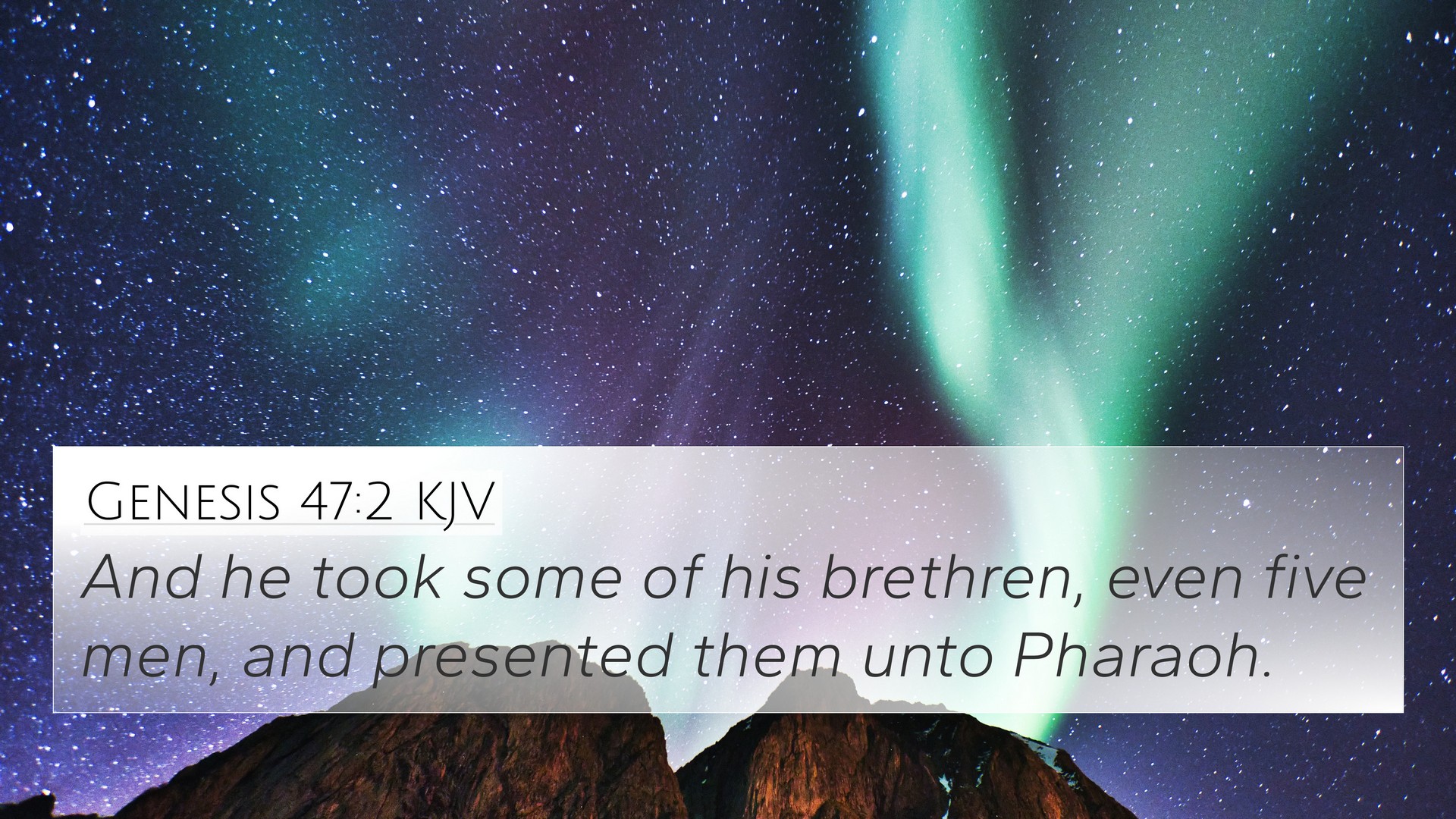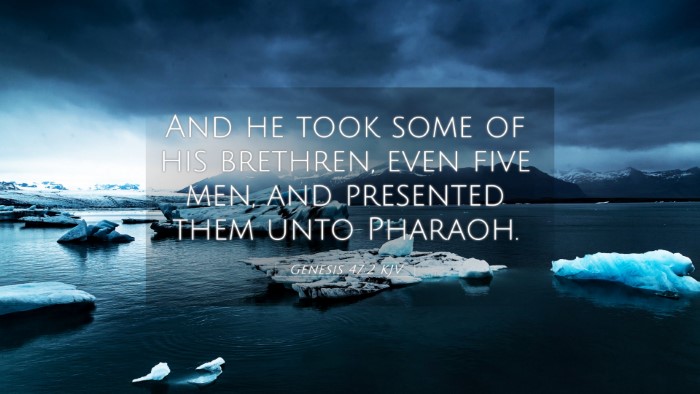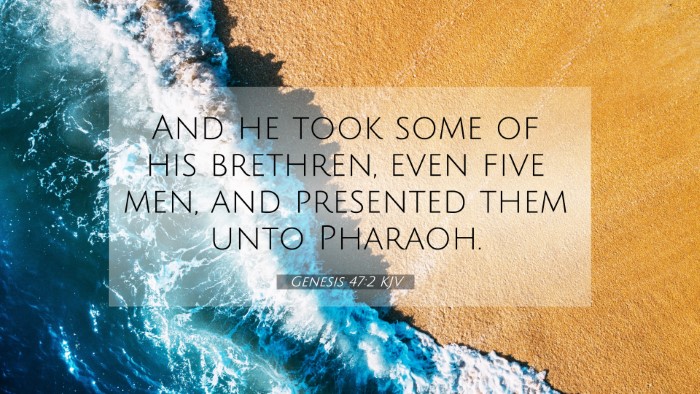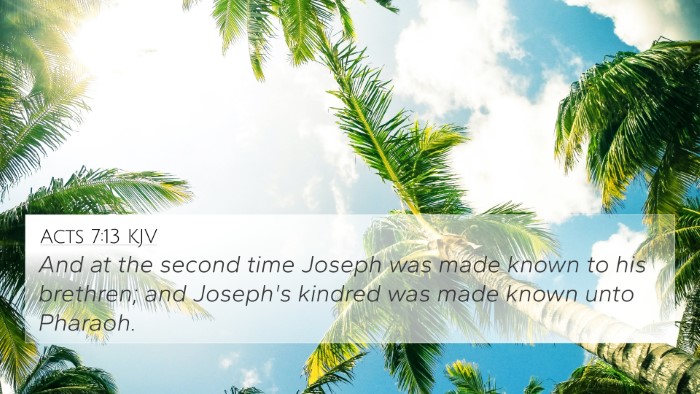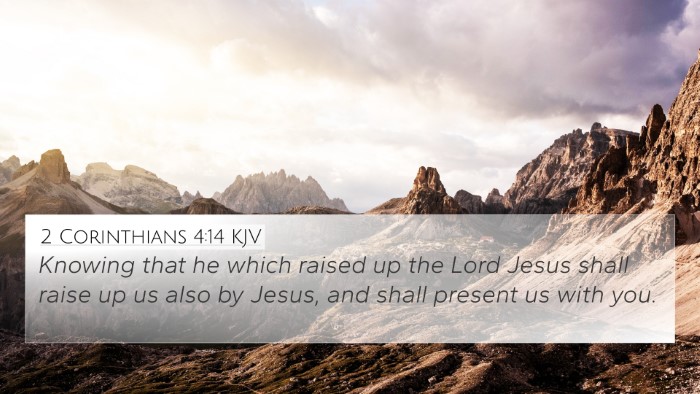Understanding Genesis 47:2
Genesis 47:2 states: "And he took some of his brothers and presented them to Pharaoh." This pivotal moment in the narrative reveals the interactions between Joseph, his family, and the Egyptian ruler, highlighting themes of familial responsibility and divine providence.
Contextual Overview
In the broader context of Genesis, the chapter presents Joseph as a powerful figure in Egypt, having risen from slavery and imprisonment to become second in command under Pharaoh. This transition not only fulfills God's promise to Joseph but also sets the stage for the future of Israel as God's chosen people.
Meaning and Interpretation
According to Matthew Henry, this verse emphasizes Joseph's reconciliation with his family and his role in protecting them during the famine. Joseph’s act of introducing his brothers to Pharaoh highlights his loyalty to his family while navigating his position of power in a foreign land.
Albert Barnes elaborates on this by noting the significance of Joseph's brothers coming into the presence of Pharaoh. It signifies a change in their status from that of mere shepherds to individuals recognized by one of the most powerful leaders of the time. This interaction marks a transformation in their lives, foreshadowing their future within Egypt.
According to Adam Clarke, the act of presenting his brothers reflects not only Joseph’s love and duty toward his family but also a strategic move to ensure their survival amidst hardship. Clarke highlights the dynamics of Joseph's position as both a servant of Pharaoh and a protector of his family, indicating a profound loyalty that transcends his authority.
Thematic Connections and Cross-References
Genesis 47:2 can be connected to several other Bible verses that underscore themes of family, redemption, and divine sovereignty. Here are some related verses for deeper understanding and comparative study:
- Genesis 45:4-5: Joseph reveals his identity to his brothers, illustrating themes of forgiveness and reconciliation.
- Exodus 1:1-5: The lineage of Jacob’s family is established as they come to reside in Egypt, setting the stage for Israel's growth as a nation.
- Matthew 10:36: Jesus speaks of the dynamics of family and loyalty, resonating with Joseph's protective instincts toward his brothers.
- Romans 8:28: This verse reflects God’s sovereign ability to work all things for good, paralleling Joseph's journey of suffering to a position of salvation for his family.
- Genesis 48:5: Jacob blesses Joseph's sons, representing a continuation of the covenant promises through Joseph’s actions in Egypt.
- Amos 3:2: God’s distinct choice of Israel as His people echoes the unique relationship Joseph seeks to maintain with his family.
- Hebrews 11:22: This verse speaks on Joseph’s faith in God’s promises regarding his family, linking back to the foundational event of him presenting them to Pharaoh.
Conclusion
In summary, Genesis 47:2 encapsulates Joseph's significant role in bridging the gap between two worlds: that of his family and the Egyptian kingdom. Through various commentaries, we see profound insights that reveal the intricate balance of loyalty, power, and divine purpose in Joseph's journey.
This verse invites readers to reflect on the broader implications of familial duty, faith, and God's overarching plan as expressed through the connections between other Scripture passages. The positioning of this narrative within Genesis serves as an essential touchstone for understanding God's promises and the unfolding story of Israel.
